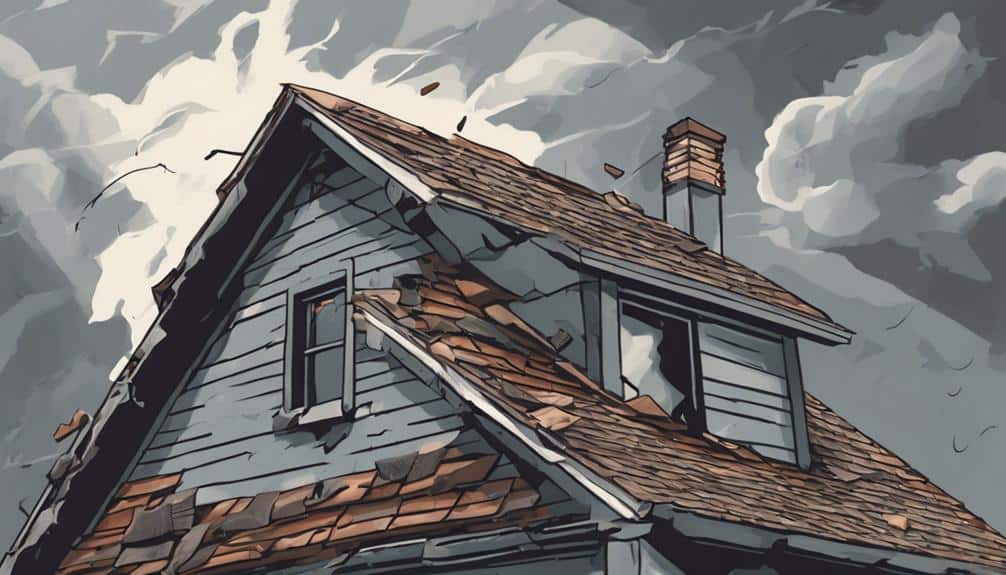You'll need to take a strategic and meticulous approach to get your insurance company to pay for your roof replacement. Start by documenting damage with high-quality photos and videos, and file a claim promptly with detailed descriptions and estimates from local contractors. Make sure you understand your policy coverage limits to avoid out-of-pocket expenses. Consider professional roof inspections to uncover hidden damage and support your claim. By following these steps and staying organized, you'll be well on your way to a successful claim – but there's more to learn to secure the coverage you deserve.
Key Takeaways
• Document roof damage with high-quality photos and videos to support your insurance claim.
• Obtain estimates from local contractors to demonstrate repair costs and expedite the claim process.
• Understand your insurance policy's coverage limits to avoid out-of-pocket expenses and ensure accurate estimates.
• Hire a licensed roofing contractor to ensure quality work, compliance with local codes, and increased chances of claim approval.
• Maintain open communication with your insurance agent to ensure a smooth claim experience and negotiate a fair settlement.
Documenting Damage and Filing Claims
When disaster strikes and your roof is damaged, swift and meticulous documentation of the damage is essential to building a strong insurance claim. You'll want to gather evidence that supports your claim, so grab your camera or phone and take high-quality photos or videos of the damaged areas. Capture images of the roof's interior and exterior, including any signs of water damage, sagging, or missing shingles. This visual documentation will help your insurance company understand the extent of the damage.
Next, you'll need to file a claim with your insurance company as soon as possible. Be sure to follow their guidelines for claim submission to avoid any delays or rejections. Provide your insurance company with detailed descriptions of the damage, along with your documentation, to support your claim.
To further strengthen your case, obtain estimates from local roofing contractors to provide evidence of repair or replacement costs. This will give your insurance company a clear understanding of the costs involved in restoring your roof to its pre-damaged state.
Understanding Policy Coverage Limits
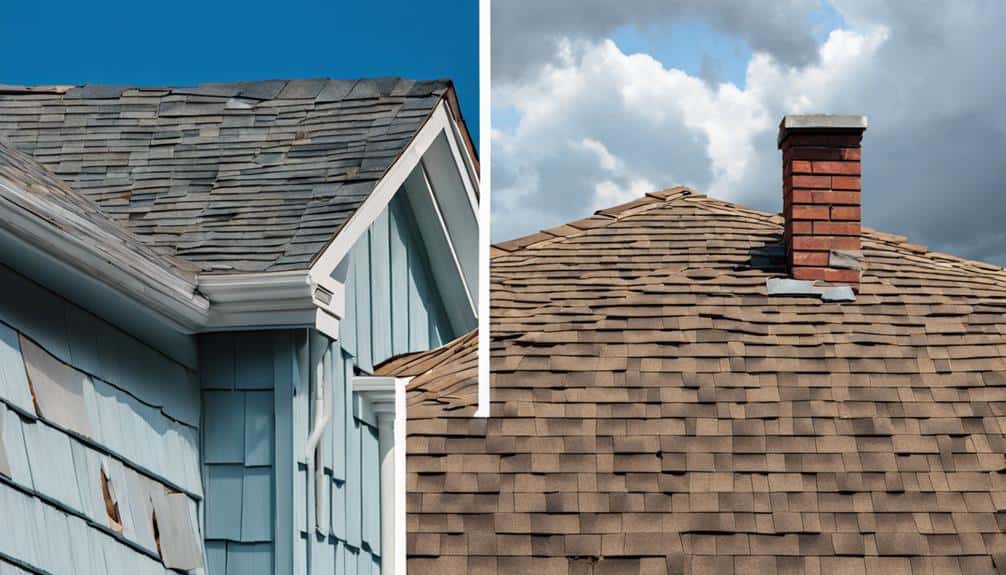
Your insurance policy's coverage limits dictate the maximum amount you can recover for a roof replacement, making it vital to grasp these limits to avoid unexpected out-of-pocket expenses.
Understanding your policy's coverage limits is fundamental to guarantee you receive adequate compensation for the replacement.
Coverage limits can vary based on the type of policy you have and the specific terms outlined in your insurance contract. It's important to review and clarify these limits with your insurance provider to determine the extent of financial assistance you'll receive for the roof replacement.
Exceeding your policy's coverage limits may result in out-of-pocket expenses for the roof replacement, which can be a significant financial burden. To avoid this, you should carefully review your policy to understand what's covered and what's not.
When reviewing your policy, pay close attention to the coverage limits, as these will dictate how much your insurance provider will pay for the roof replacement.
If you're unsure about your coverage limits or have questions, don't hesitate to reach out to your insurance provider for clarification. By doing so, you'll ensure you're adequately prepared for the financial aspects of the roof replacement process.
Getting a Professional Roof Inspection
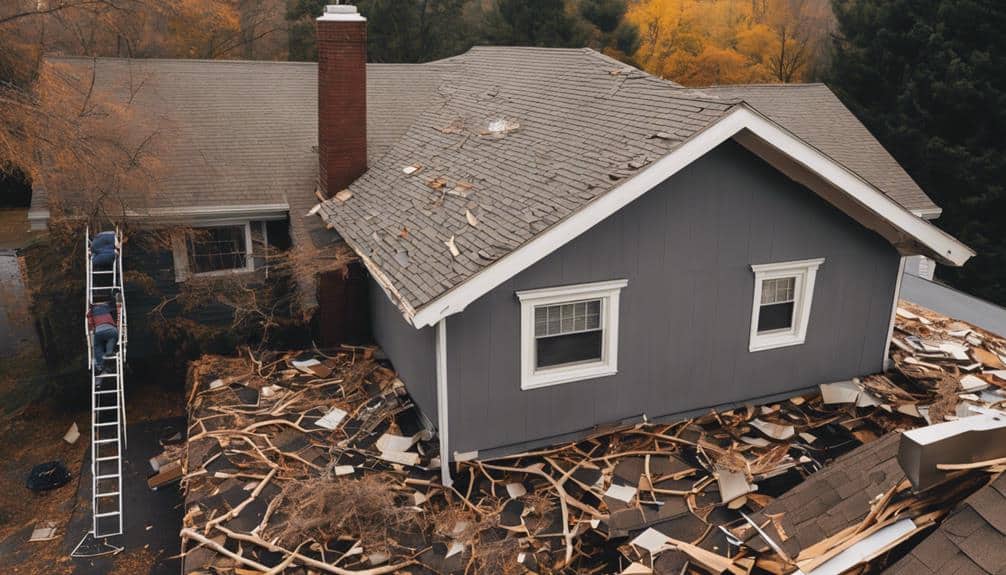
When you hire a professional to inspect your roof, they'll assess its condition and identify the sources of damage, such as hail, wind, or wear and tear.
This thorough assessment is essential in determining the extent of damage and creating a detailed report that insurance companies require.
Roof Condition Assessment
An expert roof inspection is essential to accurately assess the condition of your roof. It can uncover hidden damage and provide a detailed report that supports your insurance claim.
When you hire a professional to inspect your roof, they'll identify any issues that may not be immediately visible, ensuring you don't miss critical repairs or replacements that could impact your insurance coverage.
Reputable roofing companies will provide you with a thorough evaluation, resulting in accurate estimates for the necessary work. This inspection report serves as vital evidence for your insurance claim, expediting the process and ensuring you receive proper coverage for roof replacement.
Identifying Damage Sources
During a professional roof inspection, a trained expert will meticulously examine your roof to identify sources of damage, pinpointing issues that may not be immediately apparent to the untrained eye. This thorough examination can detect signs of wind damage, such as lifted or blown-off shingles, and hail damage, which may manifest as dents or bruises on shingles, affecting your roof's integrity. Regular roof inspections are essential for early detection of damage, preventing further issues down the line.
Working With a Licensed Contractor
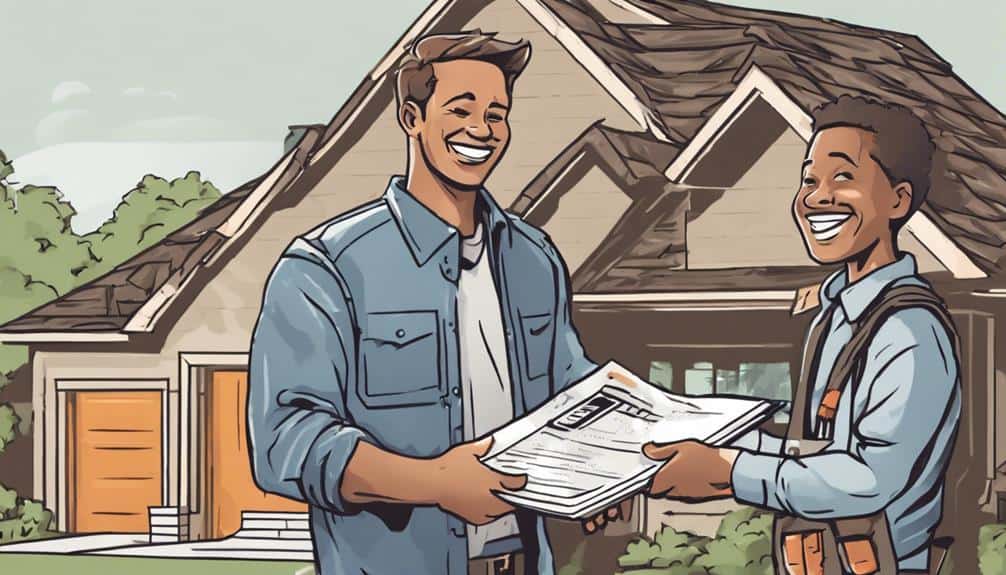
When you're working with a licensed contractor, you're ensuring that your roof replacement meets the highest standards of quality and safety. A licensed contractor's expertise and training guarantee that the job is done right, and their professionalism gives you confidence in the project's outcome.
Quality of Work Matters
By hiring a licensed contractor, you ensure that your roof replacement project meets local building codes and industry standards, setting the stage for a high-quality outcome. This is essential, as insurance companies may require work to be done by licensed professionals for coverage. A licensed contractor guarantees compliance with local building codes and industry standards, providing quality workmanship and proper installation.
| Benefits | Description |
|---|---|
| Compliance with Local Building Codes | Ensures your roof replacement meets local regulations |
| Quality Workmanship | Ensures proper installation and minimizes risk of subpar work |
| Insurance Claim Approval | Increases chances of insurance claim approval |
| Reliable Service | Provides assurance of reliable service and adherence to regulations |
Experience and Expertise Count
With a licensed contractor at the helm, you can rest assured that your roof replacement project is in capable hands, as their experience and expertise will greatly impact the likelihood of insurance coverage. A licensed contractor's expertise in roofing and familiarity with insurance claim processes guarantees that your roof replacement meets quality standards and adheres to local regulations. This, in turn, increases the chances of insurance coverage for your roof replacement.
Here are three key benefits of working with a licensed contractor:
- Accurate assessments: Licensed contractors can provide precise estimates and documentation, which are often required by insurance companies to verify the need for roof replacement.
- Credibility and professionalism: Insurance companies are more likely to pay for roof replacement when working with a licensed contractor due to their credibility and professionalism.
- Industry best practices: Licensed contractors ensure that the roof replacement meets industry standards, which can lead to faster and more successful insurance claims.
Proper Licensing and Certification
You need to verify that your roofing contractor holds the necessary licenses and certifications to operate in your area, as this guarantees their expertise and compliance with local regulations. By working with a licensed and certified contractor, you reduce the risk of poor workmanship and ensure the quality of your roof replacement. Licensing and certification indicate that the contractor has met specific requirements and standards, giving you peace of mind about the project.
A licensed contractor is more likely to follow industry best practices, leading to a successful and satisfactory roof replacement.
To confirm a contractor's legitimacy and qualifications, verify their license and certification through the appropriate state licensing board. This confirms that your contractor has the necessary expertise and knowledge to meet local regulations and industry standards.
Avoiding Insurance Scams and Fraud
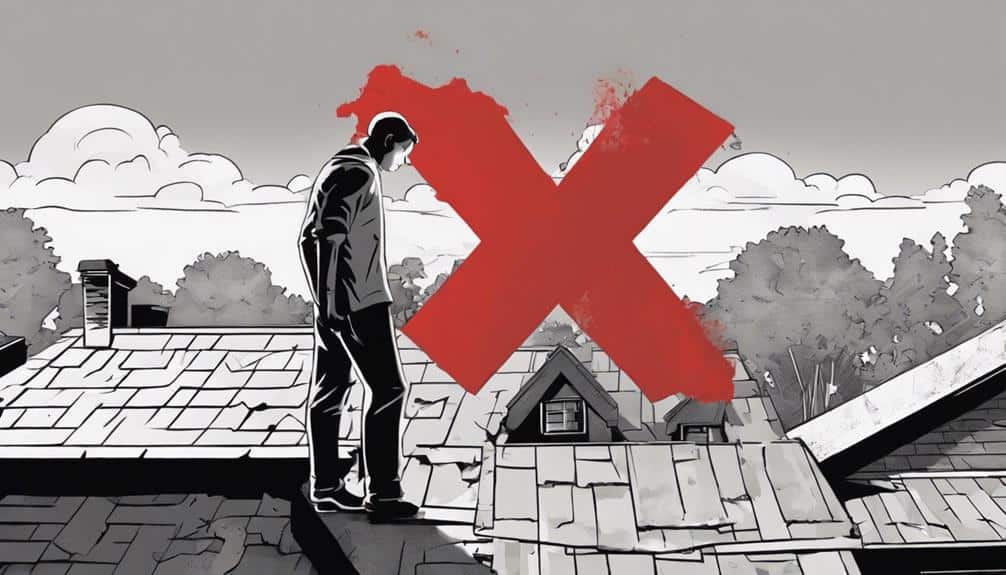
When handling insurance claims for roof replacement, it's important to be vigilant and take steps to avoid falling prey to scams and fraudulent activities. Insurance scams can be detrimental to your finances and cause unnecessary stress.
To protect yourself, be cautious of unsolicited bidders, especially after major storms, as scammers may overcharge or be underqualified.
Here are three essential tips to avoid falling victim to fraud:
- Choose local, reputable contractors for quality work and reliable service. This helps guarantee that you're working with professionals who've a reputation to uphold.
- Report suspicious proposals to your state insurance department to prevent falling victim to fraud. This can help prevent scams from spreading and safeguard others from falling prey.
- Avoid upfront deposits to unknown contractors, as legitimate professionals typically don't require this. Be wary of contractors who demand large sums of money before starting work.
Staying in Contact With Your Agent

Maintain open lines of communication with your insurance agent throughout the claims process to facilitate a smoother, more successful roof replacement experience. As you navigate the claims process, keep your agent updated with photos, estimates, and paperwork to guarantee a seamless experience. Your agent is a valuable resource, guiding you through claim requirements and procedures, offering assistance and support every step of the way.
Since insurance agencies have varying processes, staying in contact with your agent assures a smooth claim experience. Your agent can help initiate the roofing project, coordinating with roofing experts for inspections and repairs. By following their recommended steps, you can save costs and increase the likelihood of a successful roof replacement claim.
Keep your agent informed about the progress of your roofing project, sharing updates, and asking questions as needed. This open communication will help you stay on track, avoiding potential roadblocks and ensuring that your claim is processed efficiently.
Reviewing and Understanding Estimates
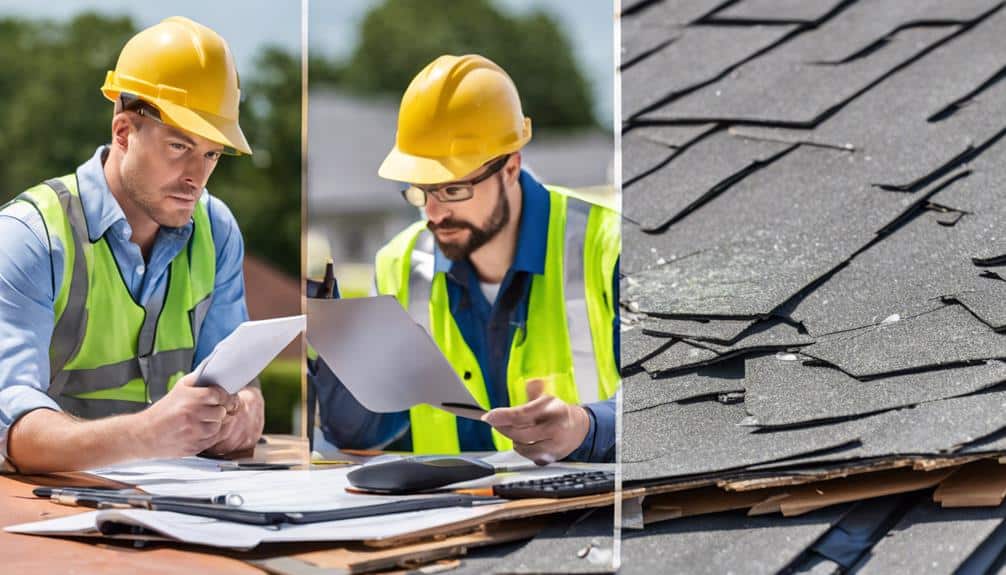
With your agent's guidance, the next step is to gather and review estimates from multiple reputable roofing contractors to get a comprehensive understanding of the costs involved in a roof replacement. This vital step helps you comprehend the scope of work, materials needed, labor costs, and any additional expenses for a transparent assessment. By doing so, you'll be better equipped to negotiate with your insurance company for a fair settlement that covers the necessary expenses.
When reviewing estimates, pay attention to the following key aspects:
- Scope of work: Make sure the estimate outlines the specific tasks involved in the roof replacement, including materials, labor, and timelines.
- Breakdown of costs: Verify that the estimate provides a clear breakdown of costs, including materials, labor, and any additional expenses, to facilitate a thorough understanding of the project's financial requirements.
- Timeline and milestones: Confirm that the estimate includes a detailed project timeline, including milestones and deadlines, to ensure a smooth and efficient roof replacement process.
Can Knowing the Property Owner Help with Getting Insurance to Pay for Roof Replacement?
When faced with the need for roof replacement, knowing how to find the property owner can be crucial in getting insurance to cover the cost. By having the property owner’s information, you can communicate effectively with the insurance company and ensure a smoother process for getting the necessary funds for the replacement.
Negotiating a Successful Claim

You'll need to provide detailed estimates and documentation of the roof damage to support your claim and justify the costs of a full roof replacement. This is important in negotiating a successful insurance claim.
Understanding the scope of work and costs involved in the roof replacement process will also give you a solid foundation for your negotiation. Working with a licensed roofing contractor can be beneficial in this process, as they can help you navigate the complexities of the insurance claim and negotiate a fair settlement with the insurance company.
Be prepared to negotiate the depreciated value of the roof based on its age and condition. This is a critical aspect of the negotiation process, as it can greatly impact the final settlement amount.
Clear communication and thorough documentation are essential throughout the negotiation process. Make sure that you maintain detailed records of all correspondence, meetings, and agreements with the insurance company and the licensed roofing contractor.
Frequently Asked Questions
How Much Does a New Roof Cost in Texas?
When you're considering a new roof in Texas, you're likely wondering how much it'll set you back. The cost of a new roof in Texas typically ranges from $5,000 to $12,000, depending on factors like materials, size, and labor.
Metal roofs can cost between $7 to $12 per square foot, while asphalt shingle roofs range from $3 to $7 per square foot.
Does Replacing Roof Increase Value Home?
You might think a new roof is just a necessary expense, but it can actually be a smart investment. Replacing your roof can increase your home's value by up to $10,000 or more!
Not only does it boost curb appeal, but energy-efficient materials can also lead to lower utility bills. When you sell, a new roof is considered a valuable improvement, providing a substantial return on investment.
What Does Actual Cash Value Mean for a Roof?
When you file an insurance claim for roof damage, you'll likely encounter the term 'Actual Cash Value' (ACV). This refers to the roof's current market value, factoring in depreciation due to age, wear, and tear.
As you consider insurance payouts, understanding ACV is essential. It may affect the amount you receive, as insurers often base payments on ACV rather than the full replacement cost.
Why Does the Roofer Get the Depreciation Check?
You're probably wondering why the roofer receives the depreciation check, like a conductor getting the final score. It's because they're responsible for completing the roof replacement work.
As the middleman, the roofer guarantees the insurance company's investment is used efficiently. By holding the depreciation check, the insurer ensures the roofer completes the job.
Once finished, the roofer submits an invoice, and the insurer releases the depreciation check, making sure you and the roofer are fairly compensated for the work.
Conclusion
By following these steps, you'll be well-equipped to navigate the process of getting insurance to pay for roof replacement.
For example, after a severe hail storm, the Smiths discovered significant damage to their roof. By documenting the damage, understanding their policy coverage limits, and working with a licensed contractor, they were able to successfully file a claim and receive full reimbursement for a new roof.
With persistence and attention to detail, you too can guarantee a successful claim and get the coverage you deserve.
